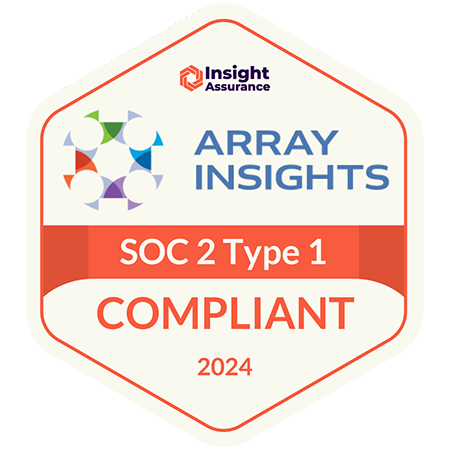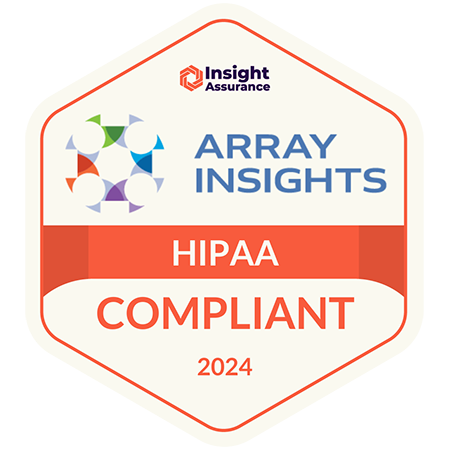Building a Next-Gen Clinical Data Federation: Q&A with Gretchen E. Vaughan of the Kidney Cancer Association
What does it mean to be a leading patient advocacy group?
For the Kidney Cancer Association, the mission is clear: “serving and empowering patients and caregivers, and leading change through advocacy, research and education.”
Through a unique and robust clinical data strategy, the KCA provides an example of how a next-generation patient advocacy group can enable much-needed breakthroughs.
Many kidney cancer treatments are ineffective: only about 25-40% of kidney cancer patients respond to treatment options, according to the KCA. Additionally, 25% of kidney cancer patients have a rare subtype with a drastically reduced number of treatment options.
The KCA has partnered with Array Insights to launch its KCA Data Federation, which will turn a high volume of rich, valuable kidney cancer data into a comprehensive database that researchers can easily — and compliantly — access.
The data federation will include clinical data sets from multiple hospitals across the country, with an expected expansion to a larger number of institutions in the future. Array Insights will provide its data federation platform and data security technologies for the project, enabling privacy-preserving practices that ensure the ethical use of patient data.
The Array Insights team was joined by Gretchen E. Vaughan, President & CEO, KCA, who answered five questions about the project — and explained what it means to be a next-gen non-profit health organization:
What are the goals and mission of the KCA?
For more than 30 years, the KCA has stood for excellence in research and education as well as the thoughtful, patient-driven services we extend to the patients and caregivers who have placed their trust in us. We are more committed than ever to being a global community dedicated to supporting and empowering patients and caregivers and leading change through education, research and advocacy.
What prompted you to begin building the Kidney Cancer Data Federation?
When it comes to research, data is power. The more we know about the collective medical history, demographics, lifestyle, tumor types, treatments and other outcomes among people with kidney cancer, the more powerful the toolbox for answering a wider variety of cancer questions.
The good news is that a lot of data about kidney cancer already exists thanks to decades of clinical trials, sizable patient databases and medical record keeping during routine treatment and care. Ideally, this information should be accessible to all researchers. However, there are three key obstacles that prevent access: siloed data, limited data, and patient privacy.
Before we launched the KCA Data Federation, the research we supported was siloed at institutions or between 2-3 collaborative institutions. We turned to Array Insights to harness new technology to lead the next era of kidney cancer research.
How has Array Insights acted as a partner throughout the process?
Array Insights has gone above and beyond to attend conferences and help connect clinicians to create excitement around the project and they’re open to questions and meetings to help drive it forward. We expect to begin the onboarding and implementation process with our first hospital partners soon.
What aspect of the KCA Data Federation is most exciting?
The KCA Data Federation includes the identification of new effective treatments for rarer kidney cancer types, early kidney cancer detection through new biomarkers, new standards of care and faster enrollment in clinical trials. The ability to harness the data specifically for rare kidney cancer types is the most exciting thing the federation can offer initially. These cancers are often neglected in research and the limited data makes progress even more difficult. The federation can help bridge these difficulties.
As a trained data scientist and health information expert, Dr. Eric Perakslis, a former KCA board member, did his own analysis after his rare papillary renal cell carcinoma diagnosis in the mid-2000s.
“I looked at my stats, they were all horrible,” Eric said. “My daughter was three years old and I roughly had about a ⅓ chance to see her reach her eighth birthday.”
Although he was treated at a large cancer center, there was little existing data to help guide Eric and his care team about which treatments might be more effective than others or how to keep his constant migraines at bay. Surgery and physical activity helped Eric through to survivorship, but with more patient data, his journey could have been faster, easier, and more predictable.
Why would you recommend Array Insights to other patient advocacy groups and non-profit health organizations?
Array Insights has the resources, infrastructure, and passion to transform healthcare research and we’re excited to partner with them on this next chapter. Now is the time to harness new technology to change the landscape of kidney cancer as we know it today.
About the Contributor
Gretchen E. Vaughan is the President and CEO of the Kidney Cancer Association (KCA). Appointed in 2018, Vaughan spearheads the KCA’s growth from an organization with a long history in professional education and development to a global community of leaders making an impact in research, advocacy, and support for people affected by kidney cancer.
If you’re looking to build a data federation for your PAO or non-profit organization, schedule a call with Array Insights.


